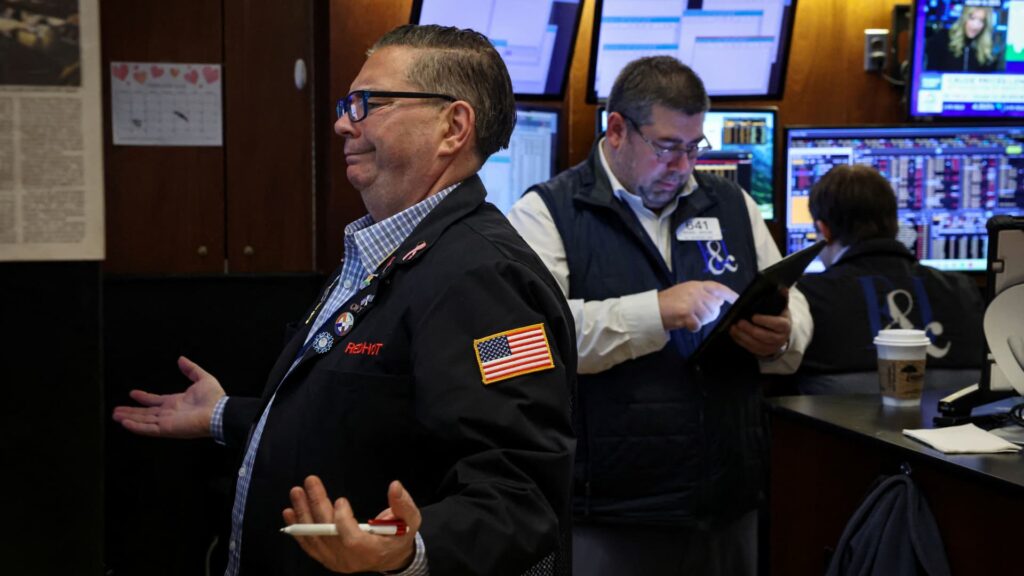Traders work on the floor at the New York Stock Exchange (NYSE) in New York City, U.S., February 12, 2025.
Brendan McDermid | Reuters
Humans are forward-looking creatures. It allows us to plan for the future, increasing our chances of survival and success, but can also bog us down as we get mired in anxiety and inaction.
There was a delicate tension between those two aspects in markets on Thursday.
The monthly reading of the U.S. producer price index for January came in slightly hotter than forecast. But some components in the PPI dropped in cost, which could lead to a soft personal consumption expenditure prices index report, according to Citigroup estimates.
Meanwhile, despite U.S. President Donald Trump signing an executive order for reciprocal tariffs, he held off from hitting countries with levies immediately.
Eventually, optimism and relief won over fears and worries, rallying stocks. It could be a case of “tomorrow will be better” or “we’ll deal with tomorrow’s problems tomorrow.” As much as we plan for and project into the future, there are things only tomorrow will tell.
What you need to know today
Signing in reciprocal tariffs
U.S. President Donald Trump on Thursday signed a presidential memorandum laying out his plan to impose “reciprocal tariffs” on foreign nations. Under the plan, the U.S. will treat other countries’ non-tariff policies, such as value-added taxes, as unfair trade practices that warrant tariffs in response, Trump said. The reciprocal tariffs will only take effect after the White House studies the appropriate tariff levels for each affected country.
Markets look at silver lining
U.S. stocks rose Thursday on the back a rally in tech stocks and relief that Trump’s reciprocal tariffs weren’t kicking in immediately. The S&P 500 climbed 1.04%, the Dow Jones Industrial Average rose 0.77%, and the Nasdaq Composite climbed 1.5%. The pan-European Stoxx 600 index added 1.09%. Germany’s Dax index rose 2.09%, its biggest one-day gain in two years, thanks to Siemens shares popping more than 7% on better-than-expected first-quarter profits.
High wholesale prices, but soft within
The U.S. producer price index in January increased by 3.5% for the year, the Bureau of Labor Statistics reported Thursday. For the month, wholesale prices rose 0.4%, higher than the Dow Jones estimate for 0.3%. Despite the higher-than-expected reading, there are signs in the report prices may be cooling. Physician care, for instance, fell 0.5%, while domestic airfares declined by 0.3% and brokerage services prices were off 2.2%.
Bringing in the coins
Coinbase on Thursday reported fourth-quarter earnings that massively beat expectations. The crypto marketplace’s revenue jumped more than 130% to $2.3 billion from $953.8 million a year earlier. Net income came in at $1.3 billion, higher than $273 million in the same quarter the previous year. Coinbase benefited from a massive rally in bitcoin after Trump, who promised crypto-friendly policies, was elected as the 47th U.S. President.
Apple and Alibaba
Alibaba Group Chairman Joe Tsai confirmed on Thursday that the company was partnering Apple to roll out artificial intelligence for iPhones sold in China. ″[Apple] talked to a number of companies in China, and in the end, they chose to do business with us. They want to use our AI to power their phones,” Tsai said at the World Governments Summit in Dubai. Apple shares jumped 2% on the news, while U.S.-listed Alibaba shares climbed 1%.
[PRO] Likeliest threat to market
There are three major risks to the stock market, according to Piper Sandler. The investment firm drew that conclusion after looking at 27 instances of corrections in the S&P 500 over the past 60 years. This time, one threat, in particular, has the highest chance of causing stocks to pull back.
And finally…
U.S. President Donald Trump and Russian President Vladimir Putin at a joint press conference after their summit on July 16, 2018, in Helsinki, Finland.
Chris McGrath | Getty Images News | Getty Images
Talks to end the war with Russia are set to begin — but Ukraine could pay a high price for peace
U.S. President Donald Trump said on Wednesday he spoke to both Russia President Vladimir Putin and Ukraine President Volodymyr Zelenskyy on the phone, and that both leaders said they wanted peace. Trump said he instructed U.S. officials to begin peace talks immediately. Before Trump’s announcement, U.S. Secretary of Defense Pete Hegseth had poured cold water on Ukraine’s hopes of joining military alliance NATO and of regaining lost territories after Russia’s 2014 invasion of Crimea.
Ukraine is waking up to the hard reality that its biggest ally and benefactor, the U.S., could ask the country to pay a high price for peace. Beyond Kyiv, Ukraine’s allies in Europe appear to have been stunned by Trump’s unilateral move, with the continent’s top officials voicing concerns that they could be left on the sidelines of the peace talks.







